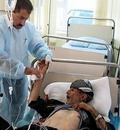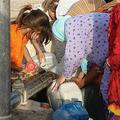 伊拉克北部接二連三出現因腹瀉嘔吐症狀而住院的病例,引發當地對霍亂爆發的恐懼。
伊拉克北部接二連三出現因腹瀉嘔吐症狀而住院的病例,引發當地對霍亂爆發的恐懼。
蘇拉曼尼亞(Sulaimaniyah)的主要看診醫院在4月平均每天會有25名罹患類似症狀的病患前來就診,而這些症狀和霍亂的初期症狀相當類似。然而截至目前為止尚未證實任何霍亂病例,讓當地官員相當擔憂。
「我們真的很害怕爆發霍亂疫情」庫德區域政府健康部長奧斯曼(Ziryan Osman)如此表示。根據蘇拉曼尼亞綜合醫院所做的統計資料顯示,4月約有400名病患出現腹瀉嘔吐症狀,與3月份的260例相比,人數急速爆增。
霍亂是一種具有潛在致命性並以飲水做為散播媒介的疾病,會引發嚴重的腹瀉和脫水,又以孩童及老年人為感染的高危險群。
2007年在當地所爆發的霍亂疫情,導致2000人感染、24人死亡,其中又以北部的蘇拉曼尼亞最為嚴重,約有14人染病身亡。
健康部官員表示,缺乏乾淨的飲用水和持續升高的溫度,恐怕會讓當地在今年再次爆發霍亂流行疫情。由於衛生設備不良所造成的飲水污染是引發2007年霍亂疫情的主因,疫情在吉爾庫克爆發後,隨即散播到伊拉克庫德區和巴格達地區。
蘇拉曼尼亞健康部主管阿布拉杜(Sherko Abdullah)表示:「取得乾淨的飲用水對這裡的人民來說相當困難。」 此地區公共環境設備的不足,讓衛生健康工作人員遭遇無數的挫敗,由於水源供應的污染,病患在接受治療後仍會再次感染。
 蘇拉曼尼亞省副首長努利(Jutiyar Nuri)指出,庫德區域政府已提撥250億第納爾(dinars)(約2000萬美金)給蘇拉曼尼亞,以解決霍亂疫情和協助舒緩乾旱的情況。阿布拉杜也指出,由於供水系統過於老舊,乾淨水源已相當稀少,而2008年春季開始的乾旱更讓供水情況雪上加霜。
蘇拉曼尼亞省副首長努利(Jutiyar Nuri)指出,庫德區域政府已提撥250億第納爾(dinars)(約2000萬美金)給蘇拉曼尼亞,以解決霍亂疫情和協助舒緩乾旱的情況。阿布拉杜也指出,由於供水系統過於老舊,乾淨水源已相當稀少,而2008年春季開始的乾旱更讓供水情況雪上加霜。
A rash of patients hospitalized with diarrhea and vomiting in northern Iraq has raised fears of a cholera outbreak across the region.
In April, the main hospital in Sulaimaniyah received an average of 25 patients per day with such symptoms - which are very similar to those associated with cholera.
While no cases of the disease have been confirmed, officials are worried.
"We have serious fears of a cholera outbreak," said Ziryan Osman, Kurdistan Regional Government, KRG, health minister.
According to statistics from Sulaimaniyah general hospital, around 400 patients were admitted with diarrhea and vomiting in April - a big leap from the 260 cases in March.
Cholera is a potentially deadly waterborne illness that causes severe diarrhea and dehydration. Children and the elderly are particularly vulnerable to infection.
An outbreak in the region last year led to 2,000 infections and 24 deaths. Hardest hit was the northern city of Sulaimaniyah, where 14 people died.
Health officials said a lack of clean drinking water and rising temperatures in the region could spark a similar epidemic this year. The former coupled with poor sanitation was to blame for last year's outbreak, which began in the province of Kirkuk and spread throughout Iraqi Kurdistan as well as Baghdad.
"People have a great deal of difficulty getting hold of clean drinking water in Sulaimaniyah," said Sherko Abdullah, manager of the Sulaimaniyah health department.
The poor infrastructure in the region causes endless frustration for health workers, who treat patients only to have them fall ill again due to contaminated water supplies.
Jutiyar Nuri, deputy governor of Sulaimaniyah province, said the KRG allocated 25 billion Iraqi dinars (US$20 million) to Sulaimaniyah to address the cholera concerns and to help ease drought conditions.
The drought, which began in the spring, has restricted the supply of clean water, which is already sparse because of the outdated water supply system, according to Abdullah.
全文及圖片詳見:ENS


